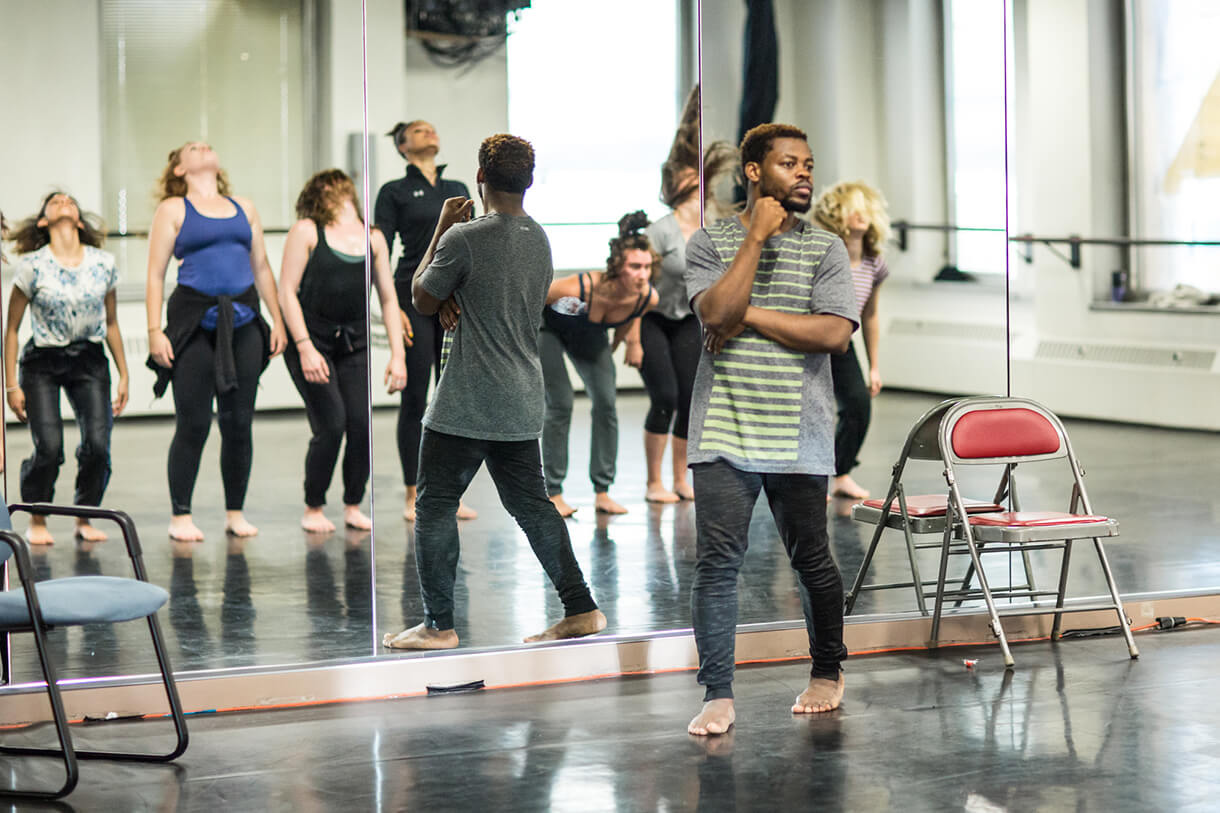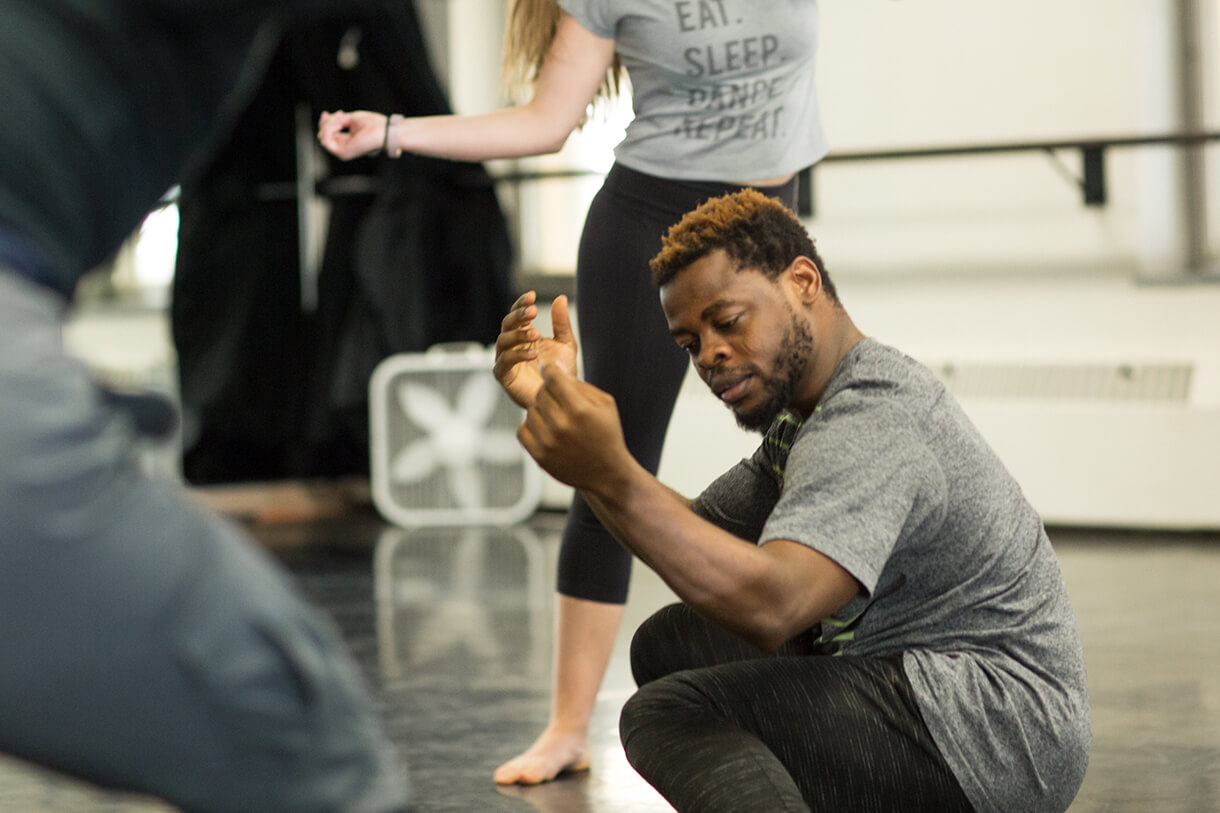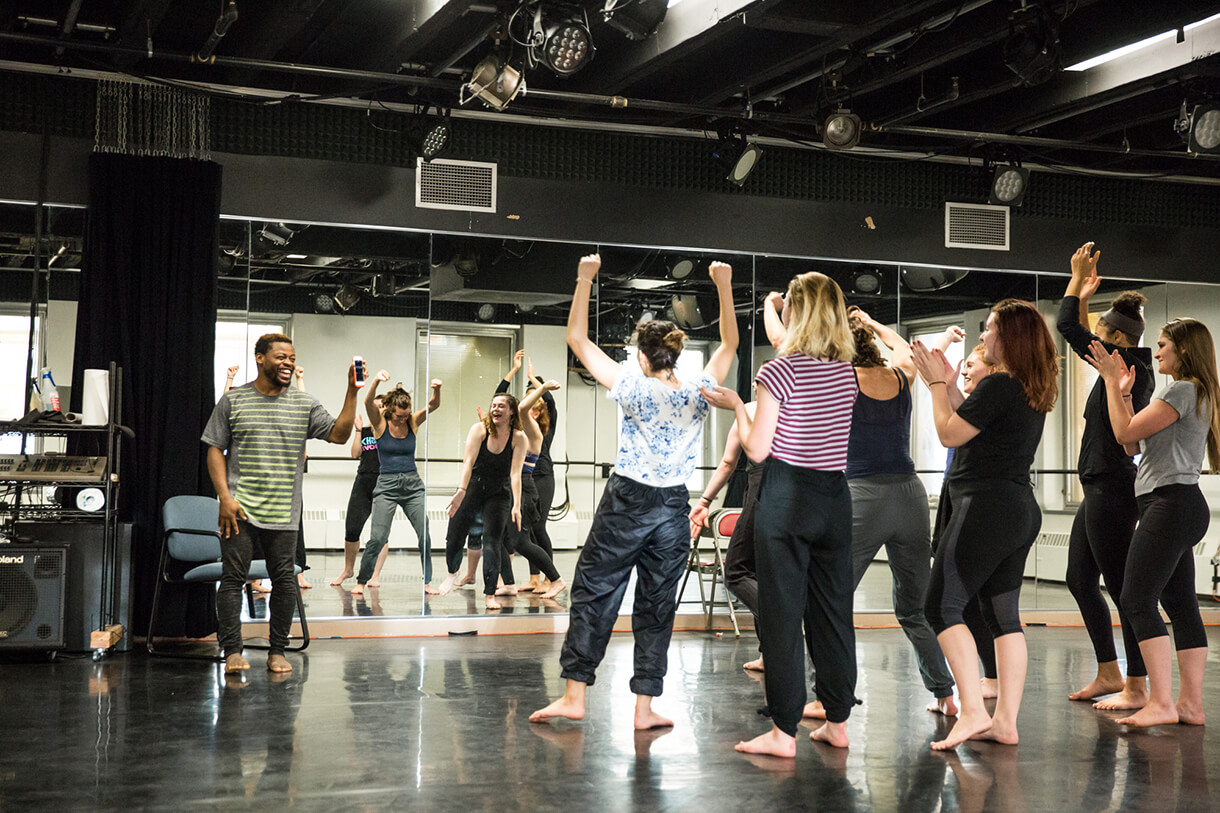Cultivating a World of Dance
This semester, the visiting practitioner-in-residence in the Dance Department is an internationally recognized dancer, choreographer, educator, and activist. His name is Qudus Onikeku and he proves how a diverse artistic approach can enrich Columbia College Chicago as a whole.
“Qudus brings an aesthetic that comes from a different cultural reference point that many students are not used to—an African one. It is rooted in Blackness and should help students recognize it within African-American expression,” says Art and Art History Associate Professor Folayemi Wilson, who co-directs Academic Diversity, Equity, and Inclusion (DEI). “Included in that aesthetic is a sense of community, a generous mechanism and capacity for collaboration, and a common humanity that can touch everyone.”
Most recently seen on the TED stage, Onikeku performs and teaches all over the world. For the Nigerian-born artist, the stage became more than a site for exhibition. Soon after graduating from school in France, Onikeku performed and traveled nonstop. After a few years, he grew fatigued of the cycle: rehearse, perform, and repeat. “As I traveled, I realized I was performing for that particular theater’s audience. They weren’t my audience. I wanted to do something different—something that cultivated community.”
In 2014, Onikeku founded the QDance Center, an organization that blends artistry and community that is both grassroots and global—which has impacted nearly 50 countries worldwide. Their centerpiece event, danceGathering, is a two-week collaborative festival that gathers dancers, writers, musicians, architects, and scholars in Lagos. The “anti-disciplinary festival” culminates in a weekend where the artists close down Lagos’ busiest street to transform it into a sprawling public performance space.
“Imagine closing down Michigan Avenue for a weekend for art,” says Onikeku. “Just by doing that, we are making a political statement. We are saying: ‘We are here.’”
“As we work to create truly diverse, equitable, and inclusive curriculum that reflects different ways of knowing and being in the world, Qudus’ presence on our campus reminds us of the importance of thinking beyond the Western cannon. It helps our students see into the world beyond Chicago and the United States. I hope it helps them to think of themselves as artists connected to other artists across the globe.” – Raquel Monroe, Co-Director of Academic Diversity, Equity, and Inclusion
In February, current DEI Co-Directors Folayemi Wilson and Raquel Monroe traveled to Lagos, joining then-Dean of the School of Fine and Performing Arts Onye Ozuzu, who serves as the co-curator of danceGathering. They brought along alums Jovan Landry ’14, Brianna Heath ’17, and Keyierra Collins ’16. Chicago-based artists Ben LaMar Gay and current Columbia Artist-in-Residence Norman Teague were among more than 80 artists from over 15 countries to participate in the festival.
The only constraint to the loose format of danceGathering’s two weeks is that it ends in performance. Onikeku’s vision relies on the fact that when artists get together, their impulse is to create. “People would ask me ‘what are we doing?’ And I would tell them: ‘collaboration is about the ideas that never existed before people get in the room’. So I put them together.”
On October 8, Onikeku and the visiting faculty and alumni, held a Town Hall to discuss and embody the experience of danceGathering. First, the student dancers were invited to sit in a circle on the stage while video clips of danceGathering played on the screen behind them. Then, as the music rose—a whirling combination of percussion, voice, and pre-recorded sound—so did the dancers. Equal parts improvisation and emotion, the stage became a tangle of moving bodies.
Afterwards, the students—many of whom were surprised to find themselves dancing on stage on a Monday morning—talked openly about how the space helped them to overcome their discomfort in the unknown. “Improvisation is simply a different kind of composition,” says Onikeku.
It echoed the process of the danceGathering festival where artists are invited to explore in the creative process without a fixed end-product in sight from an anti-disciplinary perspective. The festival, like the stage that day, cultivates a space of discovery: “The only constraint I put on the artists who come to danceGathering is: You have to make something. That’s it. There’s no program. No pressure. I like to invite artists to remove their creative baggage—their disciplines—and explore with each other. If we know where we are going, we don’t have space to be creative.”
Upcoming Events
“AFRO+SPACE+TIME”
Elevate Chicago Dance
Onikeku will reunite with Onye Ozuzu for an improvisational performance
Chicago Cultural Center
Oct. 21 11a.m. - 11:30 a.m.
Free and open to the public
"ÌYÀMI"
Repertory Performance Workshop
The Dance Center
Columbia College Chicago
Dec. 13 and 14


